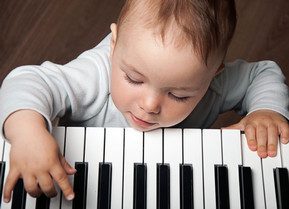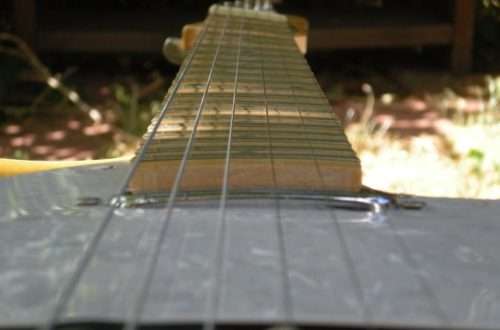
Child’s musical development: a reminder for parents – are you doing everything right?
Contents
 In many life issues, people tend to take diametrically opposed positions. Likewise, there are disagreements regarding the musical development of children. Some argue that every child must be able to play a musical instrument and study music. Others, on the contrary, say that music is something frivolous and there is no need to rack your brains over how to properly develop your child musically.
In many life issues, people tend to take diametrically opposed positions. Likewise, there are disagreements regarding the musical development of children. Some argue that every child must be able to play a musical instrument and study music. Others, on the contrary, say that music is something frivolous and there is no need to rack your brains over how to properly develop your child musically.
Each parent decides for himself what is best for his child, but it has been scientifically proven that harmoniously developed people adapt better in life. Therefore, it is not necessary to prepare every child to be a great musician, but using music to harmonize the personality is simply necessary. Music promotes brain growth by activating areas of logic and intuition, speech and associative thinking.
Music lessons are a way of self-discovery. And a person who has managed to know himself will be able to play the role of “first violin” in any team.
How to properly carry out the musical development of a child, at what age is it best to start it, what means and methods to use for this, needs to be thought through by caring parents.
Debunking myths
Myth 1. Parents often believe that since a child has no hearing, that means they should give up on music.
It has been scientifically proven that musical ear is not an innate quality, but an acquired, trained one (with rare exceptions). The most important thing is the child’s desire to study music.
Myth 2. The musical development of the baby should consist of attending concerts of classical, symphonic or even jazz music.
At the same time, it is completely ignored that his attention is still very short-lived. Strong emotions and loud sounds are more likely to harm the baby’s psyche, and staying in a stationary position for a long time is harmful and simply unbearable.
Myth 3. Musical development should begin at the age of 5-7 years.
One can easily disagree with this. A child is able to hear music and perceive it positively even in the womb. From this moment the child’s passive musical development begins.
Methods of early musical development
If parents have set themselves the goal of raising a musically developed child, they can use methods of early and even intrauterine musical development:
- “Know the notes before walking” Tyuleneva P.V.
- “Music with Mom” by Sergei and Ekaterina Zheleznov.
- “Sonatal” Lazarev M.
- Suzuki method, etc.
Since a child spends most of his time in a family that influences him every second and shapes his tastes, musical development begins here. The musical culture and musical preferences of different families are not the same, but at the same time, for full development, a combination of different types of musical activities is necessary:
- perception;
- musical and figurative activity;
- performance;
- creation.
Music is like speech
It is important to understand that learning your native language and music are identical. Children easily and naturally learn their native language using only three ways:
- Listening
- Imitate
- Repeat
The same principle is used when teaching music. A child’s musical development occurs not only during specially organized classes, but also when listening to music while drawing, quiet games, singing, performing rhythmic dance movements, etc.
We develop – step by step:
- Develop an interest in music (create a music corner, purchase basic musical instruments or create instruments with your own hands, find recordings).
- Surround your child with music every day, and not occasionally. It is necessary to sing to the baby, let him listen to musical works – individual masterpieces of the classics in children’s arrangements, folk music, children’s songs.
- When working with the baby, use various euphonious rattles, and with older children, play basic rhythmic and musical instruments: tambourine, drum, xylophone, pipe, etc.
- Learn to feel melody and rhythm.
- Develop an ear for music and associative thinking (for example, voice out loud, show or sketch in an album the images that certain music evokes, try to intone the melody correctly).
- Singing lullabies, songs, nursery rhymes to a child and singing karaoke with older children is interesting.
- Attend children’s musical performances, concerts, and organize your own performances.
- Stimulate the child’s creative imagination and artistic expression.
Recommendations
- Take into account the age and individual characteristics of the child. The duration of lessons with children should not exceed 15 minutes.
- Do not overload or force, causing rejection of the music.
- Lead by example and participate in joint music making.
- Use a combination of visual, verbal and practical teaching methods.
- Choose the right musical repertoire depending on the age, well-being of the child and the time of the event.
- Do not shift responsibility for the child’s musical development to kindergarten and school. The joint activities of parents and teachers will significantly increase the level of development of the child.
Music school: entered, attended, dropped out?
A keen interest in music and a high level of meaningfulness in older preschool age can serve as a reason to continue musical development outside the family – at a music school.
The parents’ task is to help their child pass the entrance exam, prepare him for admission to a music school, and support him. This requires little:
- learn a song with a simple melody and words that are well understood by the child;
- teach to hear and repeat the rhythm.
But often, having passed the exam and eagerly entered school, after a couple of years children do not want to study music anymore. How to keep this desire alive:
- Choose the right musical instrument that will correspond not only to the wishes of the parent, but also take into account the interests of the child and his physiological characteristics.
- Music lessons should not infringe on the child’s other interests.
- Parents must constantly show their interest, support and encourage the child.
Having set a goal and starting the first steps in the musical development of a child, every parent should remember the words of the famous teacher and pianist G. G. Neuhaus. that even the best teachers will be powerless in teaching a child music if the parents themselves are indifferent to it. And only they have the power to “infect” the child with a love of music, organize the first lessons correctly, develop the need for studying at a music school and maintain this interest until the end.
/strong



